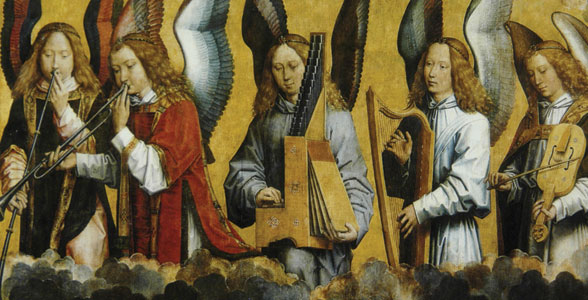One of the world’s premier musical ensembles will bring its extraordinary talents to the university’s Knoxville campus this fall. The Boston Camerata will perform three concerts as part of the Medieval and Renaissance Semester spearheaded by the Marco Institute for Medieval and Renaissance Studies.
The Medieval and Renaissance Semester is the third of the themed semesters envisioned by Chancellor Loren Crabtree to enrich the academic environment and highlight the university’s abundant and varied resources.
“It’s a tremendous coup for the university to have these artists on campus,” says Robert Bast, Riggsby Director of the Marco Institute. “This is a gift of the Chancellor’s Office to the campus and the community.” Other activities during fall semester include an exhibit at the McClung Museum, a Medieval and Renaissance Festival, Shakespeare Week, and an academic symposium, “Saints and Citizens: Religion and Politics in the Middle Ages and the Renaissance.” As musical ambassadors for the semester, Joel Cohen, the Camerata’s director, and featured soloist mezzo-soprano Anne Azma will also contribute their talents as artists-in-residence for 10 weeks, serving as distinguished visiting artist-scholars in classes in musicology, Romance languages and literatures, and medieval studies.
Kicking off the series, the ensemble will present the music of the 13th-century court of Alfonso X of Spain–also known as “Alfonso the Wise” and “King of the Three Religions”–who wove the musical, religious, scientific, and intellectual traditions of Jewish and Muslim cultures into the predominantly Christian social fabric of his kingdom. “The Iberian peninsula was a rich, diverse, multiethnic, multifaith region at that time,” says Bast.
“Alfonso’s court was a real melting pot,” says Cohen, and that diversity will be reflected in the music. For the audience, these pieces, the Cantigas, will be a novel treat. “We introduce a number of unusual instruments–an Arabic lute, a medieval-style slide trumpet, and crazy Arabic percussion instruments,” says Cohen, who will also give a talk on medieval Spain and the merging of great musical civilizations as part of the institute’s Riggsby lecture series. “It will be a beautiful experience, not at all like taking medicine,” he says.
The second performance, “Nueva Espana: Close Encounters in the New World,” illustrates musically the confluence of the colonizing Spaniards, the native populations, and the African slaves that the colonizers brought to the New World. “The Indians and blacks loved the traditional church music. They flocked to the churches to hear it,” Cohen says. “Though it was a time of terrible exploitation, there was harmony in the music during that period.”
A Haitian choir, Les Amis de la Sagesse (“the Friends of Wisdom”), based in Dorcester, Massachusetts, will be guest performers in the “Nueva Espana” program. “Some of this might remind you of salsa, like music from four-hundred years ago coming in over the radio,” Cohen says, but some of it will be completely new to the Western ear.
The third performance, “The Abbey of Love,” will feature the music of the French medieval troubadour and trouvare cultures. “Love was a hot topic in the twelfth century,” Bast says. “Monastic writers were rediscovering the importance of love and channeling it in spiritual directions.” At the same time, traveling minstrels were developing literary and musical genres for and about the lady of the manor. “Women encouraged the birth of this tradition of courtly love.”
Besides their concerts, the Boston Camerata will host an event featuring a musical tradition more familiar to a Southern audience. “Singing School: A Celebration of American Folk Hymnody” will bring to campus local groups that specialize in American shape-note singing. Known in Southern Appalachia as “Sacred Harp,” the shape-note tradition introduced a new way of teaching singing and notation to people with no formal musical training. “Harp singing is rooted in sacred music, popular hymns, and folk ballads going back to medieval times,” says Bast.
“Many of the same tunes appear in Northern songbooks too,” adds Cohen. “There is really an old American repertoire of folk hymnody, lots more vigorous and fun to sing and hear than the usual Victorian stuff.”
Though the primary objective of the Boston Camerata is clearly to entertain, their chosen repertoire serves a secondary agenda of revealing lively multiculturalism from an earlier age. “Understanding medieval and renaissance culture and history can give us a deeper understanding of the world,” says Bast. “In an increasingly global marketplace, it helps us understand the rich traditions, the successes and failures, of cultures that have shaped who we are.”
And thanks to the generosity of the Chancellor’s Office, the concerts are free all comers, first come, first served.
Marco?
Who is this eponymous Marco, you may ask. But Marco isn’t a person. This scholarly institute originated at UT Knoxville in 2001 as the Medieval and Renaissance Curriculum and Outreach Project (MARCO)–a cumbersome moniker that encompassed areas of academic strength within UT Knoxville’s College of Arts and Sciences in fine arts, classics, English, history, languages, music, philosophy, and religious studies related to the period of Europe’s Middle Ages and Renaissance.
A major turning point for Marco came in December 2003, with the award of a major National Endowment for the Humanities Challenge Grant. UT was one of only 27 U.S. cultural institutions–the only one in Tennessee–to receive this competitive grant. NEH Challenge Grants require institutions to match federal funds, so when the grant is fulfilled, private gifts matched by federal funds will provide a $3‑million endowment for the Marco Institute.
In 2004 the program officially became “the Marco Institute for Medieval and Renaissance Studies at the University of Tennessee, Knoxville.” The recognition was long overdue, says Dr. Robert Bast, the institute’s director. “For more than a century, the University of Tennessee has established a long history–too little known–of excellence in medieval and renaissance studies. Already we have established ourselves as the best program of its kind in the Southeast.
“When we fulfill our Challenge Grant, we are sure to establish a national reputation for the University of Tennessee in medieval and renaissance studies.”



